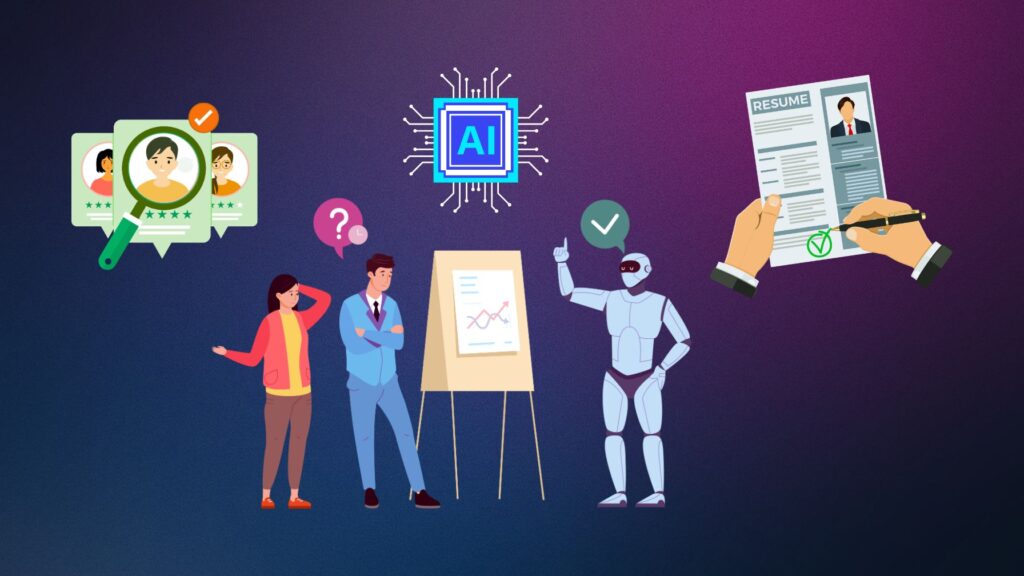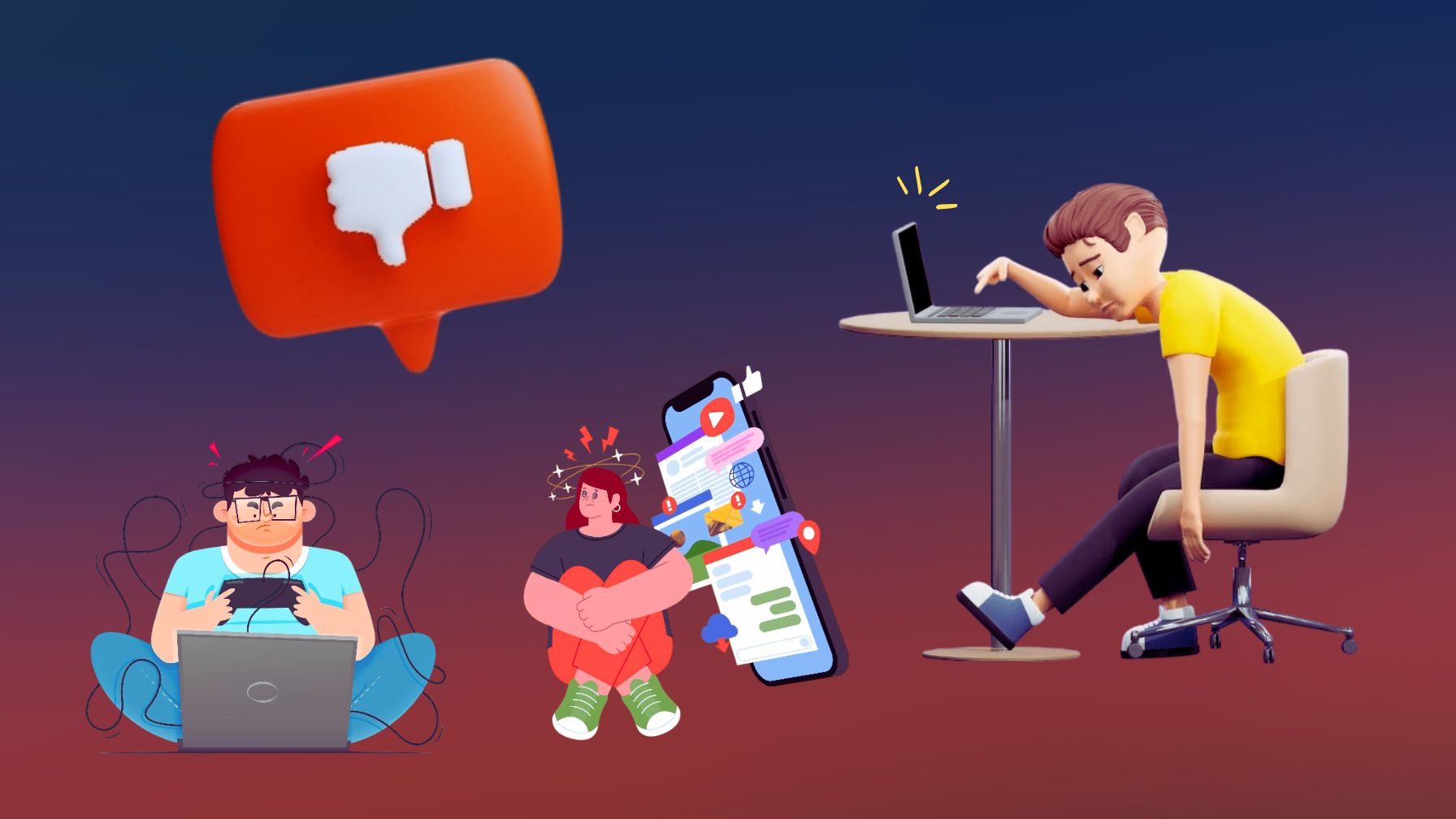At a bustling job fair in early 2025, a midsized tech startup stood out, not for its swag bags or giveaways, but for something less flashy and far more transformative. It had no recruiters on site. Instead, a sleek interface on kiosks allowed candidates to interact with an AI recruiter that conducted real-time resume screening, skills assessments, and even brief interviews.
This isn’t fiction; it’s where HR stands today. As artificial intelligence continues to shape industries, human resources has emerged as a key frontier. From hiring algorithms to employee engagement bots, AI is redefining how organizations manage and empower their workforce.
Editor’s Choice
- 65% of HR departments globally have implemented at least one AI-based tool as of 2025.
- 37% of organizations in the US use AI-driven platforms to automate their talent acquisition process.
- In 2025, AI-driven performance appraisal tools have reached a 32% adoption rate in mid-size enterprises.
- 48% of HR teams report improved employee engagement after integrating AI into internal communication systems.
- AI-enabled HR systems have reduced average time-to-hire by 23% in 2025.
- Companies using AI in payroll and compliance processes have seen a 19% reduction in administrative costs.
- 29% of firms globally now rely on generative AI for employee learning content creation in 2025.
Top Goals of Using Generative AI in HR
- Improving efficiency is the top priority for HR leaders, with 63% identifying it as their primary goal.
- 52% of HR leaders aim to improve the employee experience through the use of generative AI.
- Reducing costs is also a key driver, cited by 37% of respondents.
- 28% focus on supporting learning and development, highlighting AI’s role in upskilling and training.
- 25% see increased accuracy in processes as a major benefit of adopting AI.
- 21% want to enhance decision making, leveraging AI insights for better HR strategies.
- Interestingly, 15% of HR leaders stated they don’t intend to use generative AI in their HR processes.
- A small fraction, 1%, mentioned other goals not covered in the main categories.
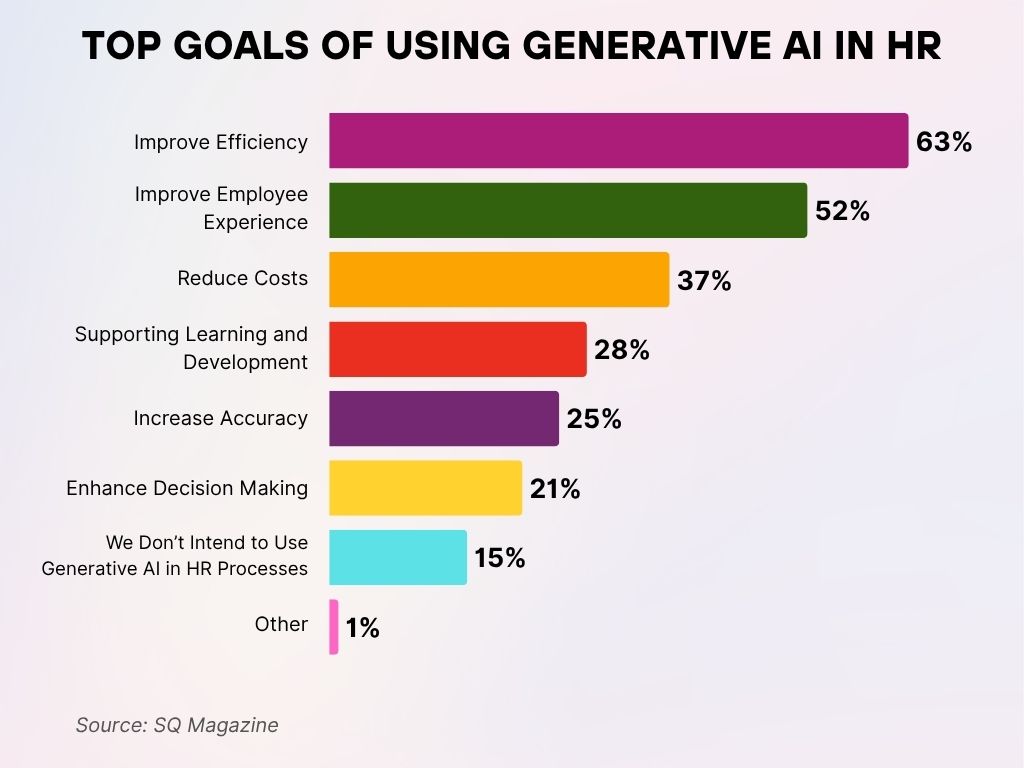
Global Adoption Rates of AI in HR
- As of 2025, AI integration in HR has been adopted by 72% of North American enterprises.
- Europe reports a 59% adoption rate, with Germany and the UK leading the charge.
- In Asia-Pacific, AI in HR has grown rapidly, with 68% of organizations in Japan and South Korea using AI-based HR tech.
- The Middle East and Africa saw AI HR usage rise to 41% in 2025.
- Globally, 82% of large enterprises will have invested in AI-driven HR analytics platforms by 2025.
- 35% of small businesses worldwide have implemented AI tools for HR purposes, an all-time high.
- Cloud-based AI HR solutions saw a 21% growth in global market share in 2025.
AI-Powered Employee Experience and Engagement Metrics
- AI-based sentiment analysis tools are used by 44% of HR teams to measure employee morale in real time.
- In 2025, 31% of organizations use AI to personalize internal learning journeys and growth paths.
- 26% of companies track real-time engagement via AI analytics dashboards integrated into HRIS.
- Employee churn prediction models powered by AI have helped reduce turnover by 18%.
- AI-assisted onboarding workflows improve new hire satisfaction scores by 24% in 2025.
- 38% of HR leaders rely on AI to monitor digital communication patterns for signs of disengagement.
- Gamified AI tools for employee development are used by 27% of global firms to boost motivation and learning.
AI in HR Market Growth Forecast
- The global AI in HR market is expected to grow from $6.05 billion in 2024 to $14.08 billion by 2029.
- In 2025, the market size is projected to reach $6.99 billion, showing strong year-over-year growth.
- The industry is set to expand at a CAGR of 19.1%, indicating rapid adoption and investment.
- Market growth will nearly double in five years, driven by automation, data analytics, and AI-powered HR tools.
- By 2027, the market is forecast to cross the $10 billion mark, signaling mainstream AI integration in HR operations.
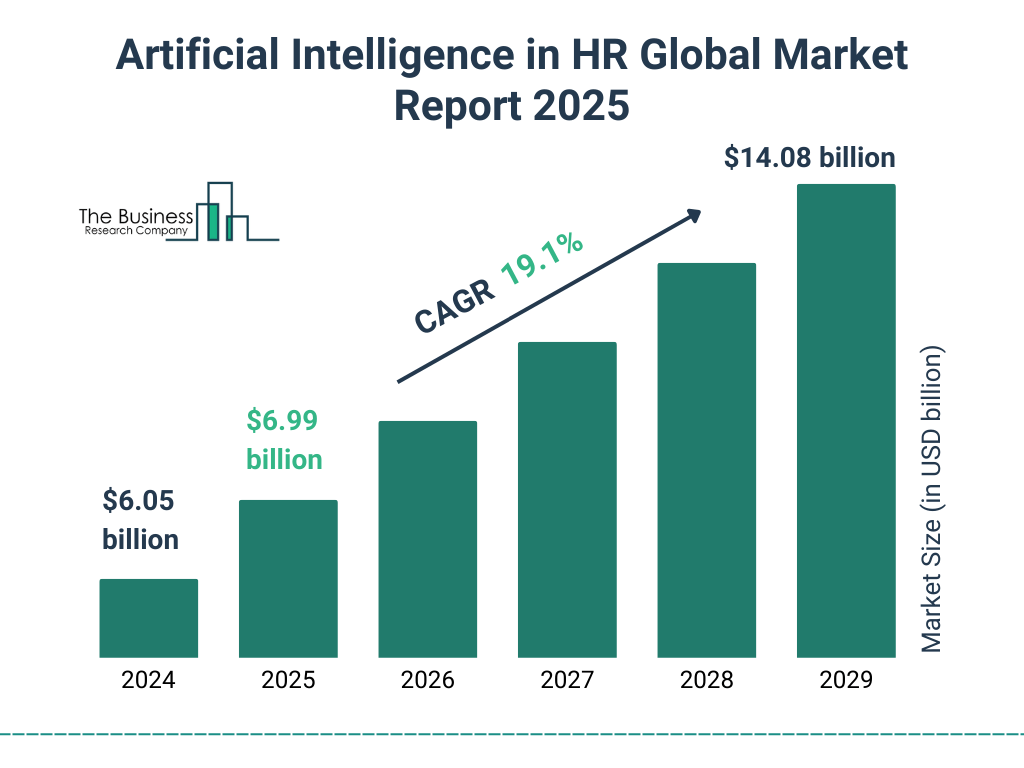
AI in Performance Management and Workforce Analytics
- 46% of HR leaders now use AI to provide real-time performance feedback to employees.
- 39% of firms employ AI to detect high-potential talent based on digital behavior patterns.
- AI performance dashboards are used by 28% of US companies to align individual metrics with company OKRs.
- 31% of organizations now use AI to analyze team collaboration patterns and productivity bottlenecks.
- In 2025, predictive models in HR have identified underperforming employees 27% faster than manual reviews.
- AI-powered 360-degree feedback platforms have seen a 33% increase in user satisfaction.
- Workforce analytics platforms using AI have improved the accuracy of employee risk scoring by 44%.
- 22% of companies use facial recognition and behavioral AI for performance tracking in high-security roles.
- Time-tracking tools with AI integration have improved task-level visibility by 19%.
- 35% of HR professionals rely on AI to customize performance improvement plans at scale.
Ethical Concerns and Bias in AI-Driven HR Systems
- 41% of HR professionals cite algorithmic bias as a top concern in AI adoption.
- 36% of organizations now audit their AI models for fairness and transparency regularly.
- 29% of companies have paused or restructured AI recruitment tools due to bias findings in 2025.
- In a global survey, 47% of employees expressed discomfort with AI being used for performance evaluation.
- AI vendors for HR tech are now required by 24% of clients to disclose training datasets and algorithmic logic.
- Only 18% of surveyed firms have established an AI ethics board within their HR governance framework.
- Facial and voice analysis tools have faced rejection from 14% of companies due to accuracy disparities across demographics.
- 25% of legal challenges in HR tech procurement now involve concerns over discriminatory AI models.
- Industry standards for bias mitigation in HR AI tools were adopted by 33% of Fortune 1000 firms in 2025.
- 20% of AI-enabled hiring systems were retrained using inclusive datasets during the past year.
AI’s Biggest Impact Areas in HR
- People Analytics leads as the top area where AI is expected to make the biggest impact, according to 50% of respondents.
- 37% of HR professionals believe Talent Acquisition will be significantly transformed by AI.
- Learning and Development is close behind, with 35% identifying it as a key area of impact.
- 17% see AI improving Performance Management, including goal tracking and employee evaluations.
- 16% believe Talent Management will benefit from AI-driven insights and automation.
- Employee Relations is also affected, though to a lesser extent, with 10% highlighting its potential for AI integration.
- Diversity, Equity, and Inclusion (DEI) comes in at 9%, showing growing but still limited AI focus in this space.
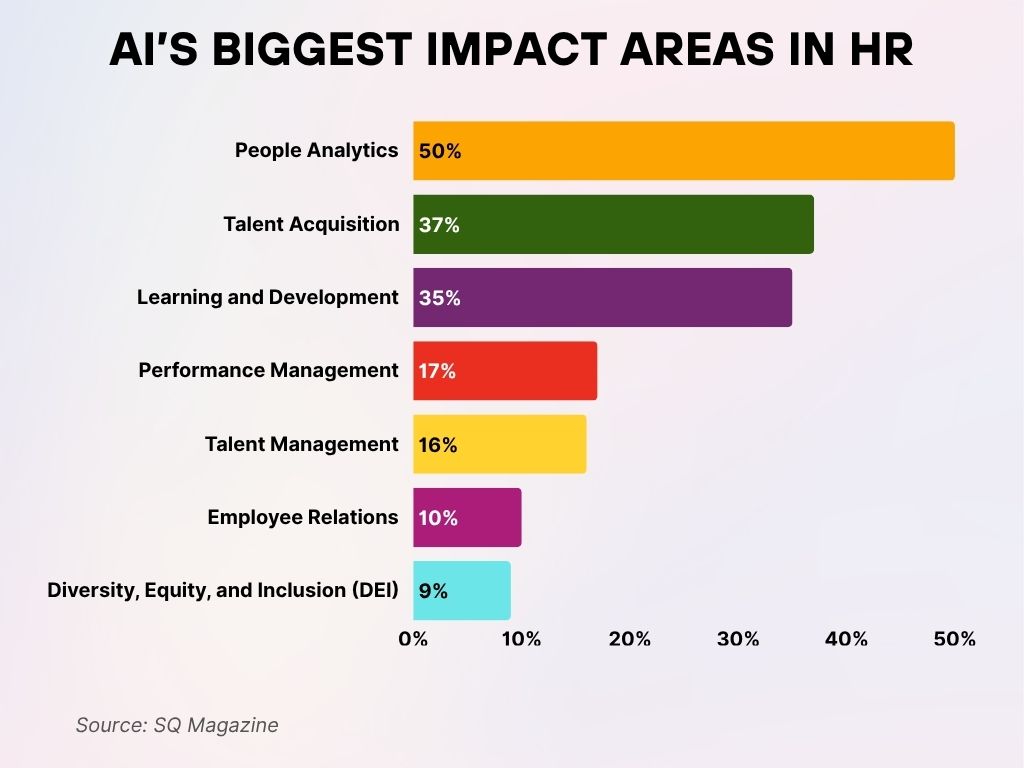
HR Professionals’ Perceptions and Readiness for AI Integration
- In 2025, 58% of HR professionals report being confident in their ability to use AI tools effectively.
- 49% of HR teams have completed formal AI training programs offered by their organizations.
- Only 17% of HR leaders feel fully prepared to manage the ethical implications of AI decisions.
- 63% of surveyed HR professionals believe AI enhances their strategic decision-making.
- 34% of respondents say AI has significantly reduced their workload in administrative HR tasks.
- 28% of HR managers feel overwhelmed by the pace of change driven by AI in the workplace.
- AI integration readiness scores improved by 31% among companies that adopted AI three years ago.
- In-house AI literacy programs are now offered by 42% of US-based HR departments.
- 55% of CHROs listed AI as their top priority for digital transformation in HR by 2025.
- 22% of HR professionals prefer hybrid human-AI decision systems over fully automated ones.
Industry-Specific Trends in AI-Enabled HR Practices
- 72% of tech companies use AI for continuous learning and development tracking.
- In healthcare, 44% of HR teams use AI to manage credentialing and shift optimization.
- 51% of retail businesses rely on AI to schedule their workforce based on predictive demand analytics.
- Manufacturing firms report 33% higher operational efficiency due to AI-driven HR task automation.
- In finance, 38% of HR leaders employ AI to meet compliance standards and audit readiness.
- Educational institutions use AI tools for workforce analytics and succession planning in 29% of cases.
- Hospitality companies have integrated AI for multilingual onboarding experiences in 40% of global chains.
- The energy sector utilizes AI to forecast and address labor shortages, cited by 25% of executives.
- 31% of HR professionals in logistics use AI-powered dashboards for performance visibility across shifts.
- Legal firms report using AI in 22% of HR functions for risk profiling and retention analysis.
AI Adoption in the Workplace: Usage Trends
- 75% of people are already using AI at work, showing how quickly the technology is becoming mainstream in professional environments.
- 46% of those users started using AI less than 6 months ago, reflecting a rapid surge in adoption.
- Usage of AI at work has nearly doubled in just six months, indicating fast-evolving workplace dynamics and openness to AI tools.

Role of Generative AI in Transforming HR Workflows
- As of 2025, 40% of enterprises use generative AI to draft job descriptions and interview prompts.
- 33% of HR departments apply generative AI to create personalized learning paths for employees.
- 29% of organizations use it to generate internal HR documents like policies and performance reviews.
- 47% of firms report increased content creation efficiency in HR communications with generative AI tools.
- Chat-based generative AI tools assist in answering employee HR queries in 52% of mid-to-large companies.
- Generative AI-generated training content adoption has increased by 39% in 2025.
- 26% of HR professionals use generative AI to simulate coaching conversations for manager training.
- 22% of onboarding experiences now include AI-created interactive narratives and virtual avatars.
- AI-generated FAQs and employee support content cut inquiry response times by 31%.
- In 2025, 18% of enterprises use generative AI to develop diversity training modules.
Legal and Regulatory Compliance in AI-Enhanced HR
- 56% of US-based organizations have updated their HR compliance frameworks to include AI governance in 2025.
- 31% of companies faced legal reviews or audits linked to AI use in hiring or workforce management.
- The number of HR tech vendors offering built-in compliance auditing features rose by 42%.
- 24% of HR departments reported collaborating with legal teams monthly on AI system reviews.
- Global data privacy regulations, like GDPR and CCPA, impacted 37% of AI-driven HR tool deployments.
- 19% of firms paused or delayed AI HR tool rollouts due to regulatory uncertainty.
- 28% of Fortune 500 companies now require vendors to provide an AI impact assessment before onboarding.
- 22% of compliance violations in 2025 were traced back to automated decision-making systems in HR.
- AI audit trails and explainability dashboards are now used by 35% of compliance teams.
- 14% of organizations were fined or penalized for breaching employment law with improperly configured AI systems.
Top AI Investment Priorities: HR Falls Behind
- IT operations dominate AI investment plans, with 63% of decision-makers prioritizing this area.
- 46% are focusing on data quality management, reflecting the critical role of clean data in AI performance.
- 41% of organizations are investing in product and service innovation through AI tools and automation.
- 36% plan to enhance software coding processes using AI-driven development support.
- Only 24% of AI investments are directed toward HR, talent, and skills/expertise, highlighting a lag in adoption compared to other domains.
- Finance operations/processes also received 24%, tied with HR in the investment ranking.
- Supply chain management attracted 23% of AI investment interest.
- Marketing saw the least focus, with just 20% of respondents prioritizing it for AI spend.
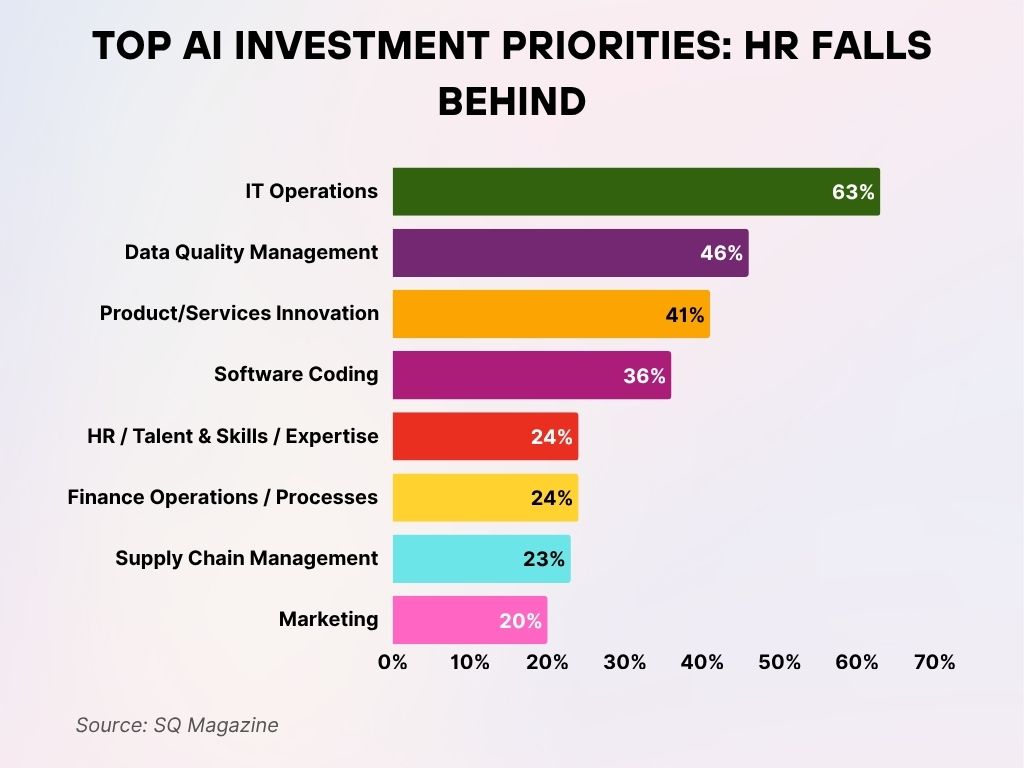
AI Training and Upskilling Initiatives within HR Departments
- 61% of companies will offer formal AI literacy programs tailored for HR professionals in 2025.
- 44% of HR employees have completed AI upskilling certifications from internal or third-party providers.
- Companies investing in AI training for HR report a 27% higher rate of AI tool adoption.
- HR leaders with AI fluency score 32% better in digital transformation KPIs.
- 29% of organizations integrate AI skill-building into leadership development programs.
- AI onboarding simulations are used by 36% of companies to train new HR hires more efficiently.
- Peer-led AI training circles exist in 21% of enterprise HR teams to share use cases and knowledge.
- 18% of firms partner with universities or AI education providers for HR-specific learning tracks.
- Internal HR academies offering AI training grew by 31% over the past year.
- 25% of CHROs list AI upskilling as the number one priority for HR capability development in 2025.
Industries Facing the Highest AI Disruption Risk
- In the technology sector, 32% of job roles and a staggering 69% of headcount are at risk of significant disruption from AI.
- The insurance industry follows with 31% of roles and 40% of headcount exposed to AI-driven changes.
- Life sciences show 23% of roles and 34% of headcount at risk, indicating notable but moderate disruption potential.
- In retail, the impact is relatively lower, with 21% of roles and 22% of headcount identified as vulnerable.
- Overall, the technology sector leads in potential workforce transformation, both in job variety and volume affected.
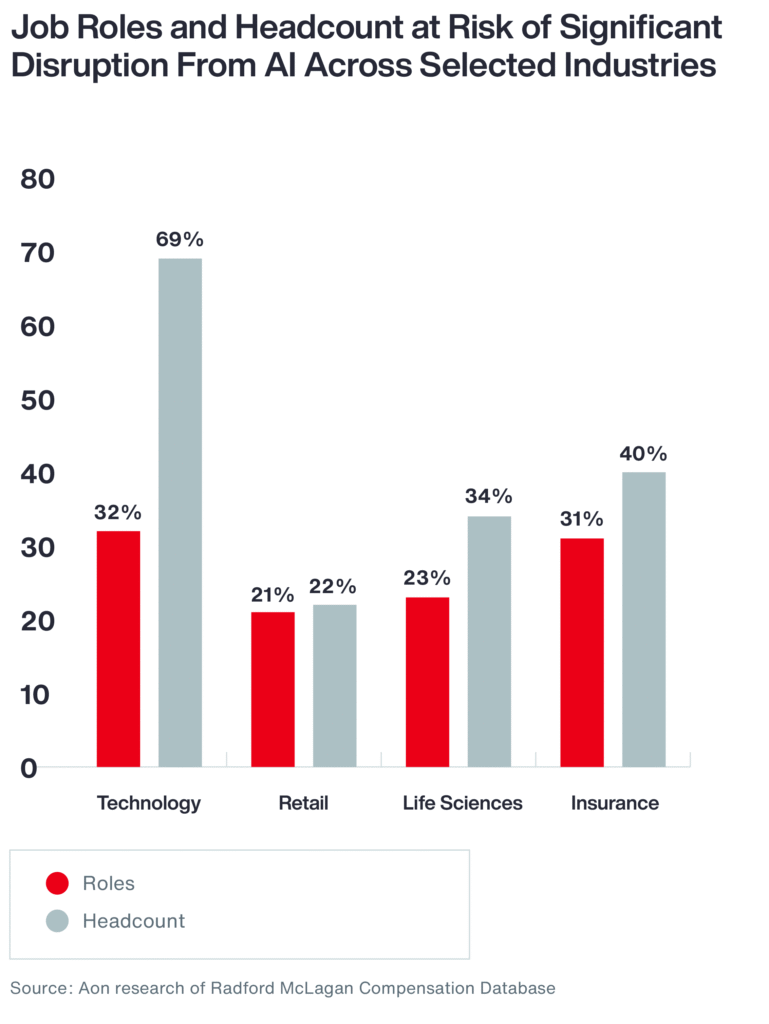
Recent Developments
- The global HR AI market is valued at over $7.6 billion in 2025, with a projected CAGR of 21.3%.
- A leading enterprise software company released a unified HR-AI analytics platform, adopted by 17% of Fortune 100.
- 12% of job seekers now interact with AI avatars for first-round interviews.
- A major class-action lawsuit involving an AI hiring platform set a new precedent for bias disclosure transparency.
- 38% of newly funded HR tech startups in 2025 are focused on AI-first solutions.
- Open-source AI HR models have increased adoption among SMBs, with usage doubling in one year.
- AI-based employee wellbeing trackers were cited as a priority in 33% of HR budget allocations.
- New industry certification standards for ethical AI in HR are being piloted by 28% of multinational companies.
Conclusion
In 2025, artificial intelligence is no longer a futuristic idea for HR; it’s a foundational pillar reshaping the field. From automating tedious processes to uncovering hidden talent and fostering deeper engagement, AI has become an indispensable tool for modern HR leaders. Yet, as its influence grows, so do the responsibilities: ensuring fairness, preparing teams, and aligning with legal frameworks.
Organizations that embrace AI with both ambition and accountability are poised not just to improve HR operations but to create workplaces that are smarter, more inclusive, and truly future-ready.

